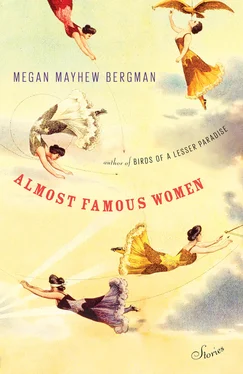She led him to the ring, careful not to look back, not to show fear. She was the leader and he should follow. She walked the ring, then had him canter, and trot. His muscles excited her. They showed potential. They would make her a winner. Holding on to his lead line, she walked closer to his face.
“Back up,” she said.
He didn’t. She pressed his broad chest until he moved. “Back up.” She leaned into his back legs to make one cross over the other, the way his mother would have done in the paddock when he was young.
“You’re stronger than I am,” she said calmly. “But I’m more determined than you. Throw me and I’ll get back on. I’ll whip you raw.”
They could say what they wanted to about her in town. They could say she was a bad wife, too young. They could say she was cruel. She had a stable all to herself in the evenings, and wasn’t that better than watching your sad sack of a husband drink himself stupid, fighting him off because you didn’t want to sleep with a flaccid, unshowered maniac? Yes. The empty stable was better, even if it meant being unable to buy new clothes. Even if it meant buying your own horses, the dangerous ones you could afford. The ones who’d been passed over, written off.
Don’t let your mind wander, she reminded herself. Not even for a second.
She led the stallion to the mounting block. He shifted as she gripped his mane and swung her leg over him. What man would ever be more exciting than this? she thought, squeezing the horse between her strong thighs.
“You will respect me,” she said, as he began to turn without her cue. His body stiffened and his head began to dip. He was going to try to throw her, she could feel it.
This battle of wills was real and she would win. She would give herself fully. This moment was falling in love.

At last someone had done something to make them individuals again, they were someone, no longer merely the number tattooed on the arm.
— An extract from the diary of Lieutenant Colonel Mervin Willett Gonin, DSO, who was among the first British soldiers to liberate Bergen-Belsen in 1945

THE INTERNEES BERGEN-BELSEN, 1945
We would be famous in an ugly way. We would be black-and-white pictures in textbooks. We would be clavicles and cheekbones and bald heads to learn from.
We could smell the bodies of our own kind.
We were sitting on lice-infested beds when the British soldiers came. The liberators. The heroes that shuttled us through hastily assembled outdoor showers. They hung sheets on the barbed wire to give us privacy, but modesty was something we’d lost. We walked slowly to and from the showers in striped bathrobes, a pattern none of us could look at later in life without pause, without bile rising. Without fear.
They made swings for the children and pushed them into the sky. They deloused us with DDT, spraying it into our hair and underneath our skirts.
We sat next to each other on the floor, covered in sores. Some of us were dying of typhus. Some of us were just dying. Some of us drank water and picked through tin cans of food, though we couldn’t eat as much as we wanted. Our bodies couldn’t take it. We vomited. We sorted through discarded clothes and disintegrating shoes. We made fires. We looked at the five-digit tattoos on our forearms.
There was a box of expired lipstick that came off the truck. The British soldiers opened the box and threw tubes of lipstick at the crowd, and we wanted it — we were surprised how badly we wanted it — and we walked the halls, some of us still without adequate clothing, some of us with piss-drenched blankets tossed over our shoulders like shawls, with scarlet lips. We rubbed the lipstick over our mouths. Over and over. We had pink wax on our rotten teeth. We were human again. We were women.

Everything that makes the world like it is now will be gone.
— Shirley Jackson, “The Lottery”

The morning of July 27 was clear to the horizon on all sides of the main island of Timothy, once a large chunk of land but now a series of marshy islets overrun by dragonflies, which moved across town in black, buzzing swarms. The people of Timothy, descendants of men and women exiled from America fifty years ago for crimes against the environment, were gathering by the empty fountain in the square, a place that might have been a village green elsewhere but on Timothy was sand and rock, the brick paths and buildings calcified. The fountain used to flow with seawater, but they’d given up on piping it in. There were more pressing matters, like the afternoon’s lottery.
The sounds of morning were the same on any given day: the roar of waves gnawing at the shoreline, the scream of the occasional heron passing overhead, children laughing on the beach, men throwing sandbags or tinkering with the artificial reefs, and Clare Smith leading the women’s fishing co-op back from their daily expedition. They walked up from the sea to the picking house, where they broke open crabs with their fingers and skinned fish with rusted bowie knives, gossiping only a little as their eyes were on the fish; they wasted nothing. Today was no exception, and the women were sure to get back on time, as Clare and her fifteen-year-old daughter, June, were in charge of civic duties, including the lottery administration.
The children always followed Clare and the women from the beach up to the picking house to see what the catch looked like, peering into the handwoven baskets at the flopping fish not quite dead and the burlap sacks of freshly dredged oysters. But today the kids — there were only seven of them — were dutifully assembling piles of driftwood on the beach, and mounds of large conchs and shells. Clare, wearing a leather hat with fishhooks slipped over the brim, nodded at them as she and the women walked by. The children waved back to the women, who were still dripping with seawater after braving the rough currents and riptides. They carried spears and rods and threw nets over their browned shoulders like shawls made of old, threadbare lace.
Soon the men began to gather at the dry, chalky fountain, smoking hand-rolled cigarettes, possible because Clare had finally allowed rooftop gardens where people could grow burly, rustic tobacco, which they stuffed into cones of dried seaweed. It was illegal to use pasture space for anything but food crops, but they all agreed the tobacco helped keep things mellow. Now nearly everyone smoked, especially today. Even Summer Hutchison, the seventeen-year-old golden girl of the island, lit a nori cigarette and held it between her teeth as she walked toward the picking house, bucket in hand. She smiled at everyone she passed, licking her dry, chapped lips. She was always cheerful because she was in love, and no one on Timothy was really in love those days. They came to each other’s beds because they were bored or obligated, but Summer was in love and the co-op’s women agreed it made her pleasant to be around, and so they began to talk about weddings in the picking house, telling stories their mothers had told them about their own weddings, of tossed rice and horse-drawn carriages.
“We could make a veil from an old net,” Jade Sleeman said. “We’d drape it like this,” she added, gesturing toward her dark cropped hair. Her daughter Lela played underneath the table, stacking empty oyster shells on Jade’s toes while the women worked. Jade was thin but strong; her mother had been a horsewoman and a polo player before exile.
Читать дальше














